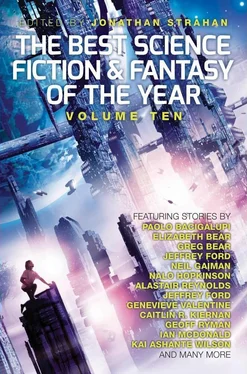The old man smiled. “Who I am is not important, son. What’s important is this room where your grandfather worked for years.”
Speechless, I gaped at him. After days of frustration and disappointment, I was standing in the room Gramps had occupied decades ago, this dingy store with its decaying inhabitants. I looked around as if at any moment Gramps might step out from the shadows.
“He was the best teacher I ever had,” Bashir said. “We used to call him the Calligrapher Prince.”
He flashed a smile. It brightened Bashir the merchant’s tired, old face like a flame.
I watched this man with his wispy moonlight hair and that coiled scar who had kept my grandfather’s secret for half a century. We sat around a low circular table, dipping cake rusk into mugs of milk chai sweetened with brown sugar. It was eight in the morning.
Bashir gripped his cup with both hands and frowned into it.
“My father was an electrician,” he said. “By the time he was fifty he’d saved enough to buy a carpet shop. With lots of construction going on, he was able to get this shop dirt cheap.
“Rugs were an easy trade back in the seventies. You hired weavers, most of ’em immigrants from up north, and managed the product. We didn’t have good relations with neighboring countries, so high demand existed for local rugs and tapestries without us worrying about competition. After the dictator Zia came, all that changed. Our shop didn’t do well, what with rugs being imported cheap from the Middle East and Afghanistan. We began to get desperate.
“Right about then a stranger came to us.”
It began, Bashir said, the evening someone knocked on their door with a rosy-cheeked child by his side and told Bashir’s father he was looking for work. Bashir, then in his late teens, stood behind his baba, watching the visitor. Wary, the rug merchant asked where they hailed from. The man lifted his head and his face shone with the strangest light Bashir had seen on a human countenance.
“It swept across his cheeks, it flared in his eyes, it illuminated the cuts and angles of his bones,” said Bashir, mesmerized by memory. “It was as if he had been touched by an angel or a demon. I’ll never forget it.”
“From thousands of miles away,” said the man quietly. “From many years away.”
It was Gramps, of course.
Bashir’s father didn’t recognize him, but he knew the man’s family. Their only son, Muhammad Sharif, had been abroad for years, he’d heard. Lived in Iran, Turkey, Allah knew where else. Sharif’s aged father still lived on Khajoor Gali in Old Lahore, but he’d shut down his design stall in the Niche of Calligraphers years ago.
“Sharif had been back for a few months and he and his son were living with his father. Now they needed money to reopen their shop.” Bashir smiled. “Turned out your grandfather was an expert rug weaver. He said he learned it in Turkey near Maulana Rumi’s shrine. My father offered him a job and he accepted. He worked with us for three years while he taught kilim weaving to our apprentices.
“He was young, hardly a few years older than I, but when he showed me his notebook, I knew he was no ordinary artist. He had drawn mystical poetry in animal shapes. Taken the quill and created dazzling worlds. Later, when my father put him before the loom, Sharif produced wonders such as we’d never seen.”
Merchant Bashir got up and plodded to a pile of rugs. He grabbed a kilim and unrolled it across the floor. A mosaic of black, yellow, and maroon geometries glimmered.
“He taught me rug weaving. It’s a nomadic art, he said. Pattern making carries the past into the future.” Bashir pointed to a recurrent cross motif that ran down the kilim’s center. “The four corners of the cross are the four corners of the universe. The scorpion here” – he toed a many-legged symmetric creature woven in yellow – “represents freedom. Sharif taught me this and more. He was a natural at symbols. I asked him why he went to Turkey. He looked at me and said, ‘To learn to weave the best kilim in the world.’”
I cocked my head, rapt. I had believed it was grief that banished Gramps from Pakistan and love that bade him return. Now this man was telling me Gramps went to Turkey purposefully. How many other secrets had my grandfather left out?
“I didn’t know he was a rug weaver,” I said.
“Certainly was. One of the best we ever saw. He knew what silk on silk warping was. Don’t weave on a poor warp. Never work on a loom out of alignment. He knew all this. Yet, he didn’t consider himself a weaver. He learned the craft to carry out a duty, he said. His passion was calligraphy. All this you see” – Bashir waved a hand at the brilliant kilims and tapestries around us, at the twists and curlicues of the verses on the walls, the wondrous illustrations – “is his genius manifested. The Ottoman Turkish script, those calligrams in our mosque, the paintings. It’s all him and his obsession with the Turkish masters.”
“He ever say why he left Pakistan or why he returned?”
Bashir shrugged. “We never asked. As long as it wasn’t criminal, we didn’t care.”
“Why’d you call him the Calligrapher Prince?”
The old man laughed. “It was a nickname the apprentices gave him and it stuck. Seemed so fitting.” Bashir lifted his cup and swallowed the last mouthful of tea along with the grounds. I winced. “Sharif was courteous and diligent. Hardly went home before midnight and he helped the business run more smoothly than it had in years, but I knew he was waiting for something. His eyes were always restless. Inward.”
In the evenings when the shop had closed Sharif drew and carved keenly. For hours he engraved, his cotton swabs with lacquer thinner in one hand, his burin and flat gravers in the other. What he was making was no secret. Bashir watched the process and the product: a large brass trunk with a complex inlay in its lid. A labyrinthine repoussé network gouged into the metal, spiraling into itself. Such fine work it took one’s breath away.
“Never, never, never,” said Bashir, “have I seen such a thing of beauty evolve in a craftsman’s hand again.”
Sharif’s concentration was diabolical, his hands careful as nature’s might have been as it designed the ornate shells of certain mollusks or the divine geometry of certain leaves.
“What are you making and why?” Bashir had asked his master.
Sharif shrugged. “A nest for ages,” he said, and the rug merchant’s son had to be content with the baffling reply.
Two years passed. One evening Bashir’s father got drenched in a downpour and caught pneumonia, which turned aggressive. Despite rapid treatment, he passed away. Bashir took over the shop. In his father’s name, he turned their old house into a small Quran center (which would eventually become Bhati’s only mosque). He ran the rug shop honestly and with Sharif’s help was able to maintain business the way it had been.
At the end of his third year Sharif came to Bashir.
“My friend,” he said. “I came here for a purpose. Something precious was given to me that is not mine to keep. It must wait here in the protection of the tree, even as I go help my father reopen his calligraphy stall.”
The young rug merchant was not surprised. He had glimpsed his master’s departure in his face the night he arrived. But what was that about a tree?
Sharif saw his student’s face and smiled. “You don’t remember, do you? Where your shop is now the eucalyptus tree used to stand.”
Bashir was stunned. He had forgotten all about the tree and the incident with the jinn. It was as if a firm hand had descended and swept all memory of the incident from his brain, like a sand picture.
He waited for Sharif to go on, but the Calligrapher Prince rose, grasped Bashir’s hand, and thrust two heavy envelopes into it.
Читать дальше












